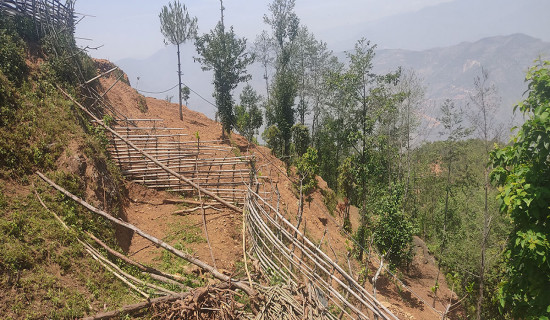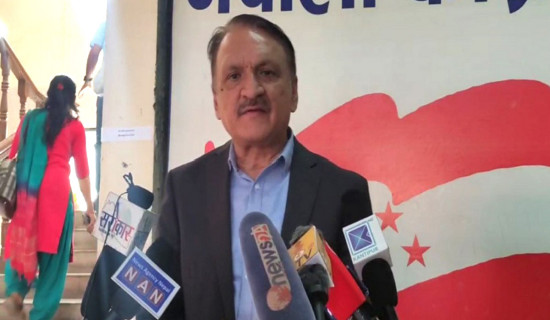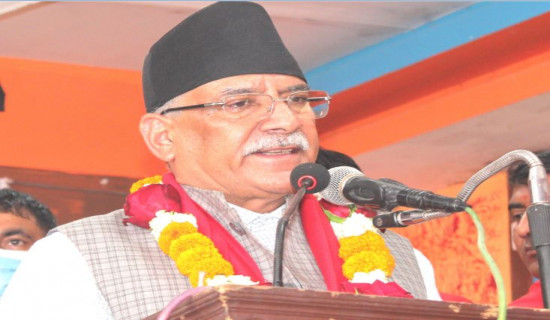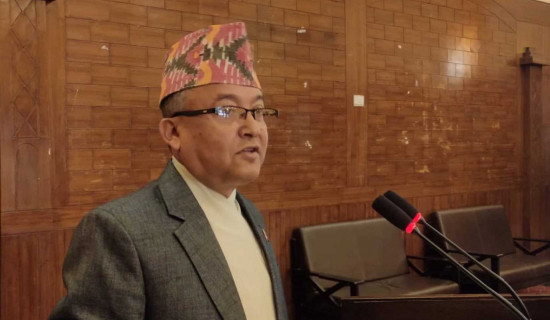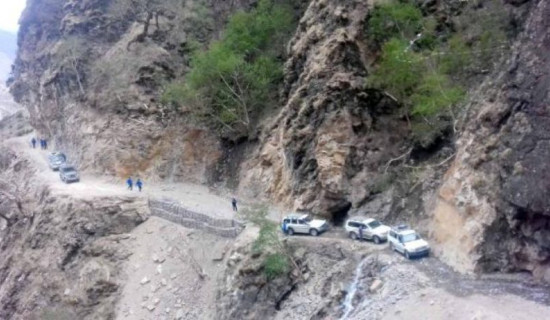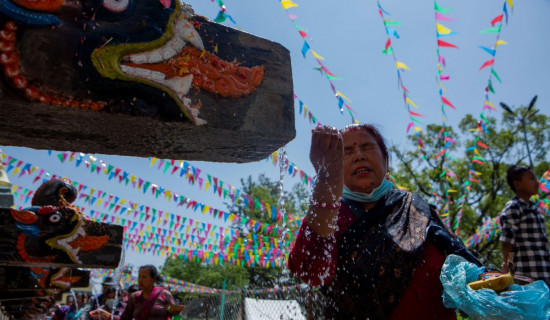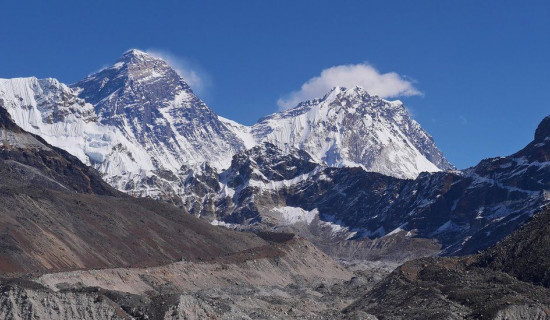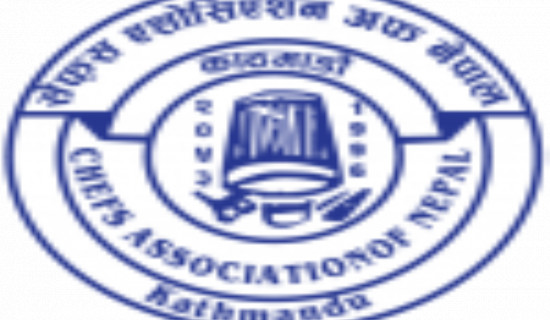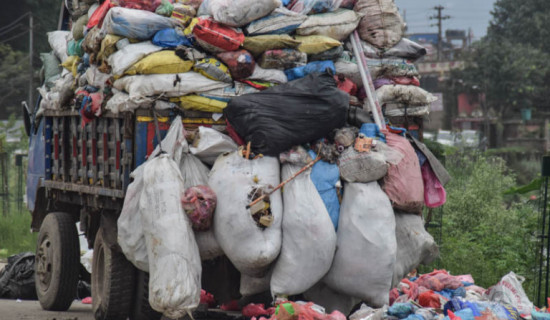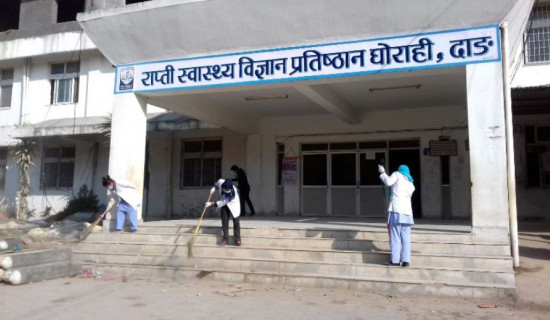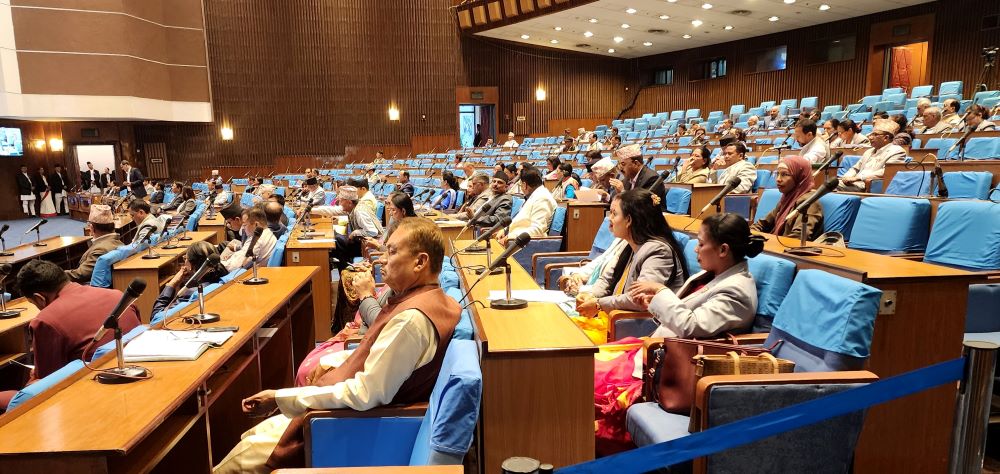- Wednesday, 3 September 2025
Foreign employment returnee Rai turns barren land into productive field
"I have a plan to utilise the remaining piece of land for growing fruits such as oranges and lemon," Rai said, adding, "I have already started rearing goats here."
NC will not forge electoral alliance with UML : Spokesperson Dr. Mahat
"We have strictly instructed the party committees at the local levels for not forging an electoral alliance with the CPN (UML) even in the event that electoral alliance is not forged among the ruling parties,"
Naiton will lose if Maoist Center loses election: Chair Prachanda
"This election is a battle for us. If we win, the nation will win and the vice versa," he said, "If the Maoist Center loses the election, it will be like the loss of the republican set up, which in turn will be the loss on part of the oppressed women, dalit, indigenous nationalities, persons living with a disability."
Nepal Airlines conducting direct flight to Saudi Arabia from April 22
The national flag carrier, Nepal Airlines, is conducting a direct flight from Kathmandu to Riyadh city of Saudi Arabia from April 22. The Nepal Airlines (NA) informed that the wide-body A 330 plane was launching the flight to Saudi Arabia.
Six new cases, 44 recoveries in 24 hours
In 1,986 Real-Time Polymerase Chain Reaction (RT-PCR) tests done in the past 24 hours, a total of six people were found infected with SARS-CoV-2, informed the Ministry of Health and Population (MoHP) in its regular update.
Civic poll on scheduled date: CEC Thapaliya
Chief Election Commissioner (CEC) Dinesh Kumar Thapaliya said the free and fair election would be held in the stipulated time.
Beni-Maldhunga road to be closed for five hours daily
Myagdi, April 16 (RSS): Beni-Maldhunga road would remain closed for five hours daily from today. Vehicular movement along the road section would be closed from 11:00 am to 4:00 pm daily till May 8 in order to upgrade it. The road section connects Myagdi and Mustang districts with the national highway. According to the Beni-Jomsom-Korala road project, the Beni-Maldhunga road would be closed in order to accelerate the construction activities of the road section in a smooth and easy manner. The Beni-Jomsom-Korala road project and the construction company had proposed the District Administration Office to close the vehicular movement along the road section after road expansion activities were affected due to pressure of vehicles. Earlier, the road section was also closed for five hours daily from December 30, 2021 to January 28, 2022. Proprietor of assistant construction company, Omkareshwor, Amrit Dahal, said that they had demanded the District Administration Office to close the vehicular movement along the road section in order to expedite road construction activities. Activities related to upgrading and expanding the 13-kilometer road linking Maldhunga of Kushma municipality-1 and Beni of Myagdi to two-lane are underway at the cost of Rs 528 million.
Commitment to prioritize child rights issues in upcoming election
Kathmandu, April 16 (RSS): Leaders of major political parties have pledged to prioritise issues and concerns related to children and child rights in their manifesto for the upcoming local level election. The local level election is slated for May 13 in a single phase. At a political discourse organized by the Children as Zones of Peace National Campaign here today, they assured to take concrete steps for implementation and protection of child rights enshrined as the fundamental rights in the Constitution of Nepal. CPN (UML) general-secretary Shankar Pokharel said that his party had been championing the cause of child rights and called for declaring schools as a peace zone since insurgency. "There is no doubt that the State should lay its focus on children to ensure the bright future of the nation," he noted. Similarly, the ruling Nepali Congress's assistant general-secretary Jivan Pariyar shared that they had been addressing many concerns related to children by holding discussions and consultations during the promulgation of the constitution. "Nepali Congress is committed to enforcing the policies and laws formulated to guarantee child rights." He lamented that the issues of child rights were neglected even in educated families. Likewise, CPN (Maoist Centre)' leader Shakti Bahadur Basnet spoke of the need to walk the talk instead of confining child rights issues to sloganeering. He viewed the current constitution as child-friendly as he argued that it was promulgated by the elected people's representatives. Child rights defender Gauri Pradhan said that the political parties, as well as the State, should prioritize concerns of child rights such as smooth registration process for childbirth, free education and free enrollment, sports, entertainment and protection of child rights. Advocate Indu Tuladhar pointed out the need to adhere to the provision in the election code of conduct that bars mobilizing children in the election promotion and forbids the use of the school for election promotion. Rajesh Sharma from the host organization urged all political parties to prioritize issues of children in their manifesto.
Balaju Bais Dhara Jatra in pictures
Hindu devotees celebrated the Balaju Bais Dhara Jatra (22 water spouts festival) on Saturday. The festival is celebrated every year on the day of Chaitra Sukla Purnima.
Route construction to Everest summit from tomorrow
The construction of the route to reach the summit of Mount Everest will start on Sunday. A team of icefall doctors had completed the construction of the route from Khumbu icefall, a dangerous route to Mt. Everest, to the second camp 6,400 meters high on April 7.
Youth Chef Competition to explore and promote Nepali cuisine at int level
The hotel management students from 11 colleges within the Kathmandu Valley will take part in the cooking competition to be organized in association with the Global Nepalese Chefs Federation and International Chefs Society, informed Federation's president Laxman Prasad Bhandari.
Governance Of Economic Life
Dev Raj Dahal, Economic society, such as agriculture, industries, business chambers, service sectors, producers and consumers associations, and cooperatives, is a key lifeline to fulfill basic necessities. It symbolizes the market transaction and is licensed by the state to do a profit, pay taxes and undertake social works in the spirit of fair business practices of conscience shuva lav. Elinor Ostrom says, “No market can survive without extensive public goods provided by governmental agencies. No government can be efficient and equitable without considerable inputs from citizens.” The peaceful pursuit of economic life cannot be delinked from the integrity of ecology, society, politics, and the apt use of resources. Incentives for economic actors do exist to utilize land, labor, capital, technology, and knowledge relative to their virtual costs and benefits. Flourishing economic life needs a system of property rights, contract enforcement, rule of law, competition rules, transport, information, and conflict easing means to keep supply-demand equilibrium. Equality and social inclusion are back in the vision of Nepal’s constitution presuming redistributive measures of diffusing prosperity across social strata. High inequality and social exclusion bear negative impacts on productivity, education, health, and social mobility.Public goodsNormally, decisions of the public economy are made by political leaders. Even private economic action has attendant effects on public policies of the government. The market fosters efficiency, the agility to fight, not equality and the free will of people. It is good at satisfying private wants, not public goods such as nature, education, health, security, rule of law, culture and infrastructure. It rewards those who can vie in market transactions, not those who are powerless and dispossessed seeking care from the government and protection from the state. But politics provides equal vote to people, the right to organize and engage in collective bargaining for wage increases, shape public policies, and grasp the loyalty of society. The inability of Nepali leadership to live up to the party and constitutional ideals made them vulnerable to climate change, dysfunctional globalization, national capability deficits in meeting the needs of the poor, economic stagnation, and coy social security. Nepal’s market is spatially segmented, not integrating and articulating to each other and widening the economy of scale. Corporate balance sheets hardly place adequate value on the nation’s natural resources. The addiction for profits has weakened ecological resilience and destroyed nature's maze of life. Human survival rests on respect for nature, its energetic life, and self-generating ecosystems of astonishing links.The operation of the economic and political syndicates in Nepal, however, marks the monopolistic tendencies of powerful business-oriented political elites, not the creation of an earth-caring, competitive market and easy access of ordinary people to essential goods. Owing to open border and transportation facilities, Nepali markets of Terai are articulating more to the Indian border towns than Nepali hills and mountains. Fragile infrastructural conditions have increased the costs of goods and proper integration of rural and urban areas. This has suffocating effects on the regional coherence of interests and intra-societal economic integration. The Competition Promotion, Market Protection and Consumer Protection Acts deem the practices of cartel, syndicate, and monopoly illicit. Economic life in Nepal turns secure if power and wealth are set at balance at the end of each generation of people. The adoption of pseudo-scientific neo-liberal policies, deconstruction of the administrative basis of the Nepali state, and use of cynical postmodern projection of groups identity and group rights have disrupted the execution of constitutional visions of right to work, social justice, social protection, and equilibrium among the executive, legislative and judiciary branches of the polity. It is unclear whether the synergy of socialist-oriented egalitarian society envisaged in the constitution is attained through the coordination of public, private and cooperative sectors when all the indicators of progress-- growth, agricultural and industrial production, current account, trade, remittance, foreign currency reserve, investment, foreign aid and tourism signify downhill path while burdens of import, debt, and inflation on the prices of essential goods uphill trail. The contribution of tax to GDP stands at about 22 percent which is inadequate to finance a self-sufficient state. In this context, the conflicting interpretation of the nation’s economic woes by the Ministry of Finance, Nepal Rastra Bank (NRB), and National Planning Commission as evident from the seminars organised by National Economic Association and NRB on Economics and Finance does only arouse the nervousness of people at a time of local election. The roots of economic woes are systemic yet economic policy wonks from the government and opposition have made only hard-hitting criticism of each other for adopting inept economic policy choices to address the nation’s problems of poverty, inequality, and marginalization, not a shared roadmap of progress.Nepali policymakers so far seem far removed from the reflection of local knowledge and society, read only the farewell of the nation-state, indulged in unhealthy economic conformity, ignored macroeconomic realities, squeezed the internal labor market, and compounded the economic ills of average Nepalis forcing them to earn in a foreign land for their livelihood. It might peeve the nation’s constitutional vision of creating an independent economy rooted in a social welfare state. The policies of labor market flexibility, no work no pay and hire, and fire of workers contradict the constitutional vision of social justice.The retreat of the Nepali state from segmental market institutions made the poor defenseless and created insecurity to the middle class - the mediating force of society - forcing it to leave the place of their origin and migrate to safer areas of developed countries while the poor in the arid part of the Gulf region as blue-collar workers. Hobbled by patronage culture, cronyism, corruption, political instability, and repulsive transition, the state is forced to take the side of the capital. Governing institutions are less robust to address post-democratic regimes and expand the productive sector of the economy parallel to constitutional promise. Leadership focus on financial capitalism marked the beginning of the crises of livelihood, economic downturn, and social struggles thus hurting the governance of economic life.Subsidy cuts on agriculture and closure of many public enterprises and privatization of essential services, such as education, health, and public utilities for rents for Nepali leadership reflect the failure to fulfill their democratic mandate and enable the public sector to play a strategic role in infrastructure investment, production, trade creation, and trade diversification and poverty alleviation. A market economy cannot function in the absence of an institutional vision of a virtuous government, social support, and adequate regulatory measures. Ironically, pre-mature de-agrarian nation, de-industrialization in favor of service sectors in Nepal bore worsening effects on the livelihood and compressed the process of social modernization. The dominance of money over democracy allowed many regimes to skate back politics into the pre-democratic era and converted people into migrants, wage workers, passive voters, and consumers. Civil society, driven by charity, has to reclaim the state’s role for the public good and avert the counter-revolution of economic leaders against the egalitarian effects of democracy and exert weight for harnessing the nation’s unutilized potential-- natural resources, clean energy, culture, tourism, production, and trade diversification and bulging youth population. Globalization has internationalized Nepal’s economic life and population and opened contact with many countries and peoples. But in no way the benefits of globalization have been deployed in productive sectors of the economy harnessing its comparative and competitive advantages both to fulfill essential needs and diversify production, trade, and commerce. The regional and global participation of national civil society in multi-level governance criticises economic policy makers for the lack of this neglect and bypassing the spirit of the constitution yet they also ignite fresh reasons for hope from a sort of global civic rebirth articulated in the global consensus to new interest in the social charter, social movements, world social forums, global consensus on climate change and Sustainable Development Goals. Democratic autonomyThe governance of economic life in Nepal is not irremediably determined by growth, private sector, market, polity, state, trade or technological import but by their cohesiveness with the community, compassion, wisdom, nature, and culture in a sustainable course. The universality of human rights has set the indivisibility of humanity and contributed to the emergence of regional and global public to debate and take action on infrastructural development, connectivity, participatory democracy, and economic diplomacy. There are 3.5 million shareholders of cooperatives of various types from bee-keeping, seed, and coffee to medicinal plants. Social cooperatives have the potential to boost the collective forms of capital ownership, weave together rival forces and provide citizens democratic autonomy. But they also express the appropriation of scarce resources by powerful persons in the allocation of projects. The government and private sector have signed a memorandum of understanding (MoU) for public-private partnership for multi-layered local development aiming to assume roles in local planning, budgeting, revenue, infrastructural development, urban development, tourism, environmental promotion, health, land use, disaster preparedness, tax administration reforms, etc. The competitive spirit of Nepali entrepreneurs, farms, and the state, however, requires strong incentives and innovation ensuring the young people are trained to become entrepreneurs in various ecological zones and utilize comparative resource advantages so as to realize the nation’s potential and attain the lofty purpose.(Former Reader at the Department of Political Science, TU, Dahal writes on political and social issues.)
Distribution of advanced breed buffaloes to farmers
BY OUR CORRESPONDENTJajarkot, Apr 15 : A cooperative in the Jajarkot district has distributed buffaloes of advanced breeds to local farmers.As per the annual approved program of the Karnali Provincial government, 10 buffaloes were distributed to 10 farmers affiliated to the cooperative through Panchase Multi-purpose Cooperative of Nalgad Municipality-5.The Province Government has introduced the program to promote milk production. The cooperative has distributed 10 milking buffaloes at the rate of Rs. 150,000 to make the farmers self-reliant by increasing their income.In order to improve the income of the animal husbandry business and make the farmers self-reliant, 10 buffaloes were brought from Nepalgunj in the grant amount of Rs. 1.5 million from the Veterinary Hospital and Veterinary Service Office. Also, Rs. 450,000 were provided from the cooperative and distributed to the farmers, said Jar Bahadur Bhakri, chief of Veterinary Hospital and Veterinary Service Office.Ganesh Prasad Gautam of Nalgad-5, who has been in the agri-animal husbandry business, said that he was very happy to get the buffalo.He said that buffalo would help them improve their income and provide education to their children.The manager of the cooperative Kishor Rawal informed that the cooperative has been distributing modern agricultural inputs and seasonal and non-seasonal vegetable seeds to the farmers.The cooperative, which was established by 25 people in 2065 BS, has now 764 share members.
KMC begins clearing garbage
By Arpana Adhikari ,Kathmandu, Apr 16 : The Kathmandu Metropolitan City’s Solid Waste Management Division has started removing garbage from the major streets of Kathmandu.Garbage dumped by households, shops, hotels, businesses, and offices had been polluting the capital for more than 10 days. But KMC, the main authority for collecting and disposing of the trash in the city, finally sprang into action on Friday and began clearing the roads and alleys of the city. Aashish Sharma, a student who roamed around Baneshwor, Lazimpat, Maitidevi, Ghantaghar, Kamalpokhari, and Durbarmarg Friday morning, was delighted to see the trash gone. “This is not how the streets of the capital frequented by tourists should be,” he said.Kalpana Shrestha, a resident of Gyaneshwor, also expressed joy at having the rubbish pile dumped near her house finally cleared.All garbage collection was stopped earlier this month due to the blockade of the Tinpiple to Mukhu Bhanjyang road by locals demanding immediate reconstruction of the damaged sections of the highway.Sailung Construction received the contract to work on the highway nine years ago. However, despite repeated deadline extensions, it has failed to work satisfactorily which caused the locals to protest. “The Road Division under the federal government is responsible for handling such road construction issues. Yet, the KMC is the body that is blamed for not taking action to dispose the city’s waste,” complained Sarita Rai, head of the Environment Department of KMC. “All we can do is request the construction company to speed up their work.”Rai said the repeated obstructions seen in the city’s waste management was due to a lack of a sustainable approach. For now, though, KMC has begun clearing the trash littering the streets and also began collecting garbage from people’s homes on Wednesday, Rai informed.This is not the first protest by the locals of Tinpiple and Tisdale. Time and again, the residents of Sisdole, the only landfill site for all the 18 local levels of Kathmandu Valley, stop garbage trucks from coming to their area citing health concerns.“The KMC has been addressing all the demands raised by the people of Tisdale. However, road reconstruction is not in our jurisdiction,” stressed Rai.Tisdale was designated a dumping site in 2005 and was only supposed to be used for three years. However, it has been more than 15 years and Sisdole is still in use.The Ministry of Urban Development has been constructing an alternative dumping site at Banchare Danda on the border of Nuwakot and Dhanding. However, the contractor has already missed multiple deadlines for its completion and work remains in limbo.“The construction of the first cell [at Banchare Danda] is complete and ready for use. However, it has remained unused because the trucks must cross Sisdole to reach it, a near-impossible task because of the mounds of garbage that cannot be driven on,” said Rai.Waste segregation made mandatoryMeanwhile, the KMC issued a public notice on Thursday asking households and businesses to mandatorily segregate biodegradable waste and non-biodegradable wastes before disposing of them for garbage collection.Such calls have been issued on previous occasions as well but the metropolis has not been able to change the habits of its residents.
24-hour free maternity service at RAHS
Bukhari, April 16 : Rapti Academy of Health Sciences (RAHS), Dang, has been running a 24-hour free maternity service since Friday. Saying Safe Motherhood Programme is now free in the Academy, Vice-Chancellor Dr. Basanta Lamichhane shared that a woman visiting the Academy to receive maternity service has not to pay any charge. After his appointment to the post of Vice-Chancellor, Dr. Lamichhane had expressed a commitment to provide free maternity services in the hospital. Earlier, the service under the safe motherhood program was free in the hospital, the woman visiting the hospital for delivery service after midnight had to pay the charge in a lack of required human resources. Vice-Chancellor Dr. Lamichhane shared that additional human resources would be added to provide free maternity service and it would be provided by mobilizing the available human resources of the hospital for the time being.


